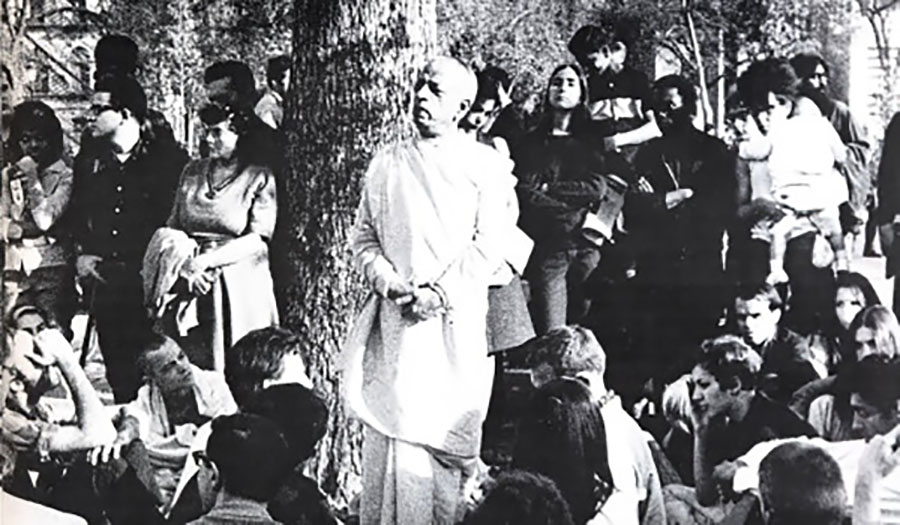ISKCON 50 Meditations: November 6, 2016
By Satsvarupa dasa Goswami | Nov 06, 2016

Slow Down and Read What the Swami Has Said
By the time I met Prabhupada I had completed four years of college and had become somewhat crazy. I would only read books that held my attention and which I thought helped me in my writing, such as Naked Lunch, Howl, Death on the Installment Plan, A Thief’s Journal, and Last Exit Before Brooklyn. So where did the Swami’s Srimad-Bhagavatam fit in along with all these hip authors? In one sense, you might expect me to think, “This is some old-fashioned commentary on a religious book from India.” But I couldn’t reject it like that, even though it wasn’t written in the American fast-paced way. Just because it didn’t supply the gratification of jargon and speech didn’t mean I couldn’t look at it. So I made an exception to my usual policy to reject anything that didn’t move quickly in the most modern frame of reference. I had to slow down to read what the Swami had said. And I found that he was saying something that made me slow down. I calmed myself and started to appreciate it without preconceptions. Besides, if I had any favoritism in religious reading, it was towards Eastern religions, and so I liked that.
“Intelligent persons do cut off the interknot of the knot of reactionary work by remembrance of the Personality of Godhead; therefore, who will not give attention to this message?”
Purport: “Contact of the spiritual spark living being with the material elements is the point of interknitting knot. . . .”
(SB 1.2.15, verse and purport, 1962 edition)
After the squeaking of brakes and calming of mind, I tried to see what the Swami was saying in Srimad-Bhagavatam, Part One. There was nothing flashy in his mode of presentation. It was a book filled with misprints, from India. One could usually guess at the intended meaning behind the misprints, such as when the book read “The Supreme Lard.” “One should surrender to the Lard. . .” But there was something I liked about this, something attractive. I liked the physical object, the brick-colored book. And I began to like the misprints, “The Lard.” I transferred that in a harmless, dovetailing way into the Swami’s book. I thought, “This is far out. This is mystical stuff! I’m gonna get into this!” (As soon as my sister heard about it, she thought it was my usual syndrome of going too far into anything. “Oh no, Stevie,” she said, “not another trip.” I said, “Hey, no, this is good. I’m gonna get into this!”) Reading Swamiji was true love. And it was a double treat—Krishna and the Swami. Sometimes Krishna would speak in the verse and then Swamiji would speak in the purports. (Swamiji seemed to be speaking in the verses also.) You got Swamiji with all his personal traits, living with us, exotic and lovable—and Krishna, who is completely lovable, the all-attractive Personality of Godhead with His cows and friends in Vrindavana. They’re always together, Swamiji and Krishna.
I read the Bhagavatam from the beginning, as he advised, but sometimes I would reach into it at random. I kept the book with me at work, in a left-hand lower drawer. To the left of my desk was our supervisor’s desk, then to my right were my coworkers like Miss Fennel and a stocky blonde-haired man who the other workers called “creeping Jesus.” Even though my supervisor was nearby, he couldn’t see over into the deep drawer. So I would open the drawer, open the book, read a little and then close it. One phrase really struck me. Swamiji wrote that there are many realistic obstacles on the path of devotional service. I thought, “He knows. Swami and the sages and Krishna know that there are many obstacles and they’re realistic about it. They know what we’re going through.” By reading a few moments at the office, and more at my apartment, I quickly (and superficially) went through the first volume. Then I started to read it again. There were things in the book that Swamiji wasn’t lecturing on. So by reading you gained supplementary knowledge to what you had heard in the classes. But in the beginning, hearing in the classes was more impressive. It’s clear to me that if I had never met Swamiji, I don’t think there’s any way I could have become a devotee of Krishna just by reading the book. The book was valuable because it was something of the Swami’s. But along with the book there was also Swamiji himself—Swamiji in the kirtanas, Swamiji in his room. Now, since his disappearance, the book is of major importance, and we sometimes think it’s all we have. And there’s plenty in the book. But at least at my first reading, I could not read deeply. Nevertheless, I was soon attached to his book, Srimad-Bhagavatam, and I didn’t want any other books. Just as before when I wouldn’t read any books except hip literature, now I didn’t want any books but Krishna’s.















